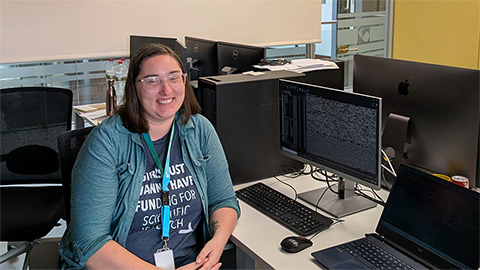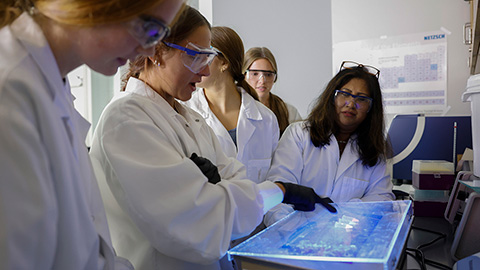Challenging science stereotypes with a video game
What was your first lab experience? I clearly recall a 10th grade biology class where we swabbed various surfaces in the lab and cultured the resulting bacteria. Gross! This early exposure to the laboratory helped inform my decision to become a scientist. Others might not see a biochemical reaction in real time until they’re taking college courses, if ever.
Research suggests that gendered stereotypes about who can succeed as a scientist or engineer directly impact student career exploration. It makes sense, then, that when girls engaged in learning experiences with a female science, technology, engineering or math role model, a 2020 study by Spanish researchers found that the girls’ interest in STEM studies and careers increased.
The demographics of current STEM professionals do not provide underrepresented students with the role models they need to consider STEM careers seriously. It does not take much looking around the lab to realize why. White men are still overrepresented in research, particularly at the management level. Students who explore research careers are unlikely to encounter a role model from an underrepresented demographic. This perpetuates and reinforces preconceived notions about what scientists and engineers look like and places an unfair burden on already overburdened minority researchers to inspire the next generation of scientists.
To break this cycle, TerraPrime is developing a digital game in a laboratory setting that creates a lab experience accessible to all and populated by all. In a virtual world, scientists can look and act now as we hope the broader scientific world will in the future. Students can see themselves in their player characters and simultaneously explore a laboratory setting that might be out of their real-world reach.
Our game, titled Research Rush, is played as a 3D top-down view of a biochemistry lab. Players create their own scientist and then run around a lab, interacting with instruments to generate resources and gain experience. Gain enough of both, and players can expand the lab and build new instruments.
In Research Rush, we have reimagined lab protocols as video game quests. Players either can create their own lab adventure in free play mode or follow a task list that walks them through a research experience such as purifying a protein or cloning a gene of interest. Eventually, each lab scenario will have unique win conditions. Players can challenge themselves to complete their goals in record time and to progress through their scientific career as they level up and unlock new skills, new instruments and new lab space.

You can watch a concept trailer showcasing the gameplay or even play a tiny bit of the prototype version of the game in your browser right now by visiting our websiteterraprime.org/research-rush-game, and subscribing to updates.
I dreamed up Research Rush when coronavirus stay-at-home orders went into effect. One day I was doing full-time lab work, and the next I was sitting at home passing the time with my main hobby: video games. I was struck by how similar the progression at the core of video games was to my now-on-pause lab experiments. Soon I was downloading game development software and digging into coding tutorials. The result is a virtual lab and a vision to change the cultural landscape of scientific research, one player at a time.
Now is the perfect time to develop digital learning tools. The past year has introduced significant involuntary changes in education, primarily through remote and internet-based schooling. Implementing new teaching techniques is always challenging, but teachers everywhere are more comfortable now with virtual learning concepts and techniques than ever before. I see this change as an opportunity to introduce students to lab research in a whole new way.
Educational games have been used to enhance learning in a wide variety of situations. However, games are underrepresented in science and engineering compared to computer science and information technology. While makers of commercial video games have partnered with government agencies to expand public engagement, the impact of these collaborations remains limited. At the same time, video and online gaming has surpassed cinema and television as the most consumed media in the U.S. and around the world. Now is the time for research scientists to use video games to engage students and the public more broadly.
TerraPrime is partnering with high school science teachers to design Research Rush. We aim to make the final product a tool that teachers can use effectively in the classroom. To achieve this, we are talking with high school scientific educators and learning what they want from Research Rush. I hope that, in addition to enjoying the game, students soon will be able to see virtual scientists who look and act as they do.
Enjoy reading ASBMB Today?
Become a member to receive the print edition four times a year and the digital edition monthly.
Learn moreGet the latest from ASBMB Today
Enter your email address, and we’ll send you a weekly email with recent articles, interviews and more.
Latest in Opinions
Opinions highlights or most popular articles

Making my spicy brain work for me
Researcher Reid Blanchett reflects on her journey navigating mental health struggles through graduate school. She found a new path in bioinformatics, proving that science can be flexible, forgiving and full of second chances.

The tortoise wins: How slowing down saved my Ph.D.
Graduate student Amy Bounds reflects on how slowing down in the lab not only improved her relationship with work but also made her a more productive scientist.

How pediatric cataracts shaped my scientific journey
Undergraduate student Grace Jones shares how she transformed her childhood cataract diagnosis into a scientific purpose. She explores how biochemistry can bring a clearer vision to others, and how personal history can shape discovery.

Debugging my code and teaching with ChatGPT
AI tools like ChatGPT have changed the way an assistant professor teaches and does research. But, he asserts that real growth still comes from struggle, and educators must help students use AI wisely — as scaffolds, not shortcuts.

AI in the lab: The power of smarter questions
An assistant professor discusses AI's evolution from a buzzword to a trusted research partner. It helps streamline reviews, troubleshoot code, save time and spark ideas, but its success relies on combining AI with expertise and critical thinking.

How AlphaFold transformed my classroom into a research lab
A high school science teacher reflects on how AI-integrated technologies help her students ponder realistic research questions with hands-on learning.

